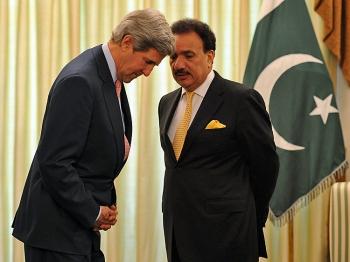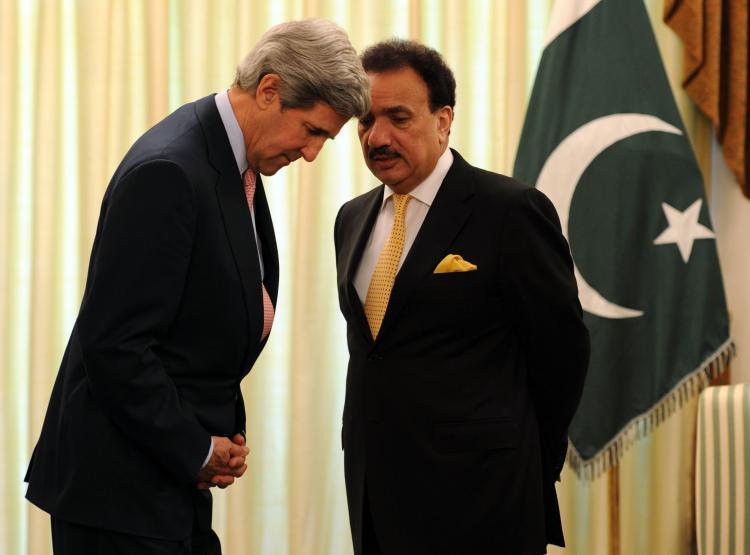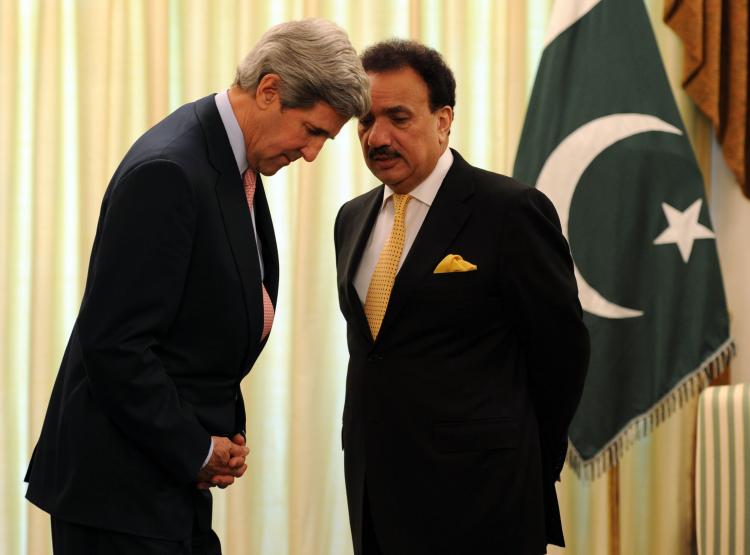Following closed discussions with top Pakistani officials, Senate Foreign Relations Chairman John Kerry announced that the “road ahead” in U.S.-Pakistan actions against terrorist groups “will not be defined by words. It will be defined by actions.”
Kerry’s May 16 visit to Islamabad, Pakistan, marked the first major discussion with Pakistani officials since the May 1 mission that killed Osama bin Laden in nearby Abbottabad. Kerry met with leading officials including President Zardari, Prime Minister Gilani, and Gen. Pasha.
In the press conference just following the meetings, Kerry stated, “We’ve agreed on a specific series of steps that will be implemented immediately in order to get the relationship on track,” according to a Senate Committee on Foreign Relations transcript.
The meeting was part of “initial steps” to get relations back on track, according to Kerry, and additional meetings will be held with Pakistani officials soon “to work on the details of implementing and building on the initial steps of today.”
U.S. relations with Pakistan became tense following the secret mission that killed bin Laden—which was launched without knowledge of Pakistani officials. It also compounded on anti-American sentiments that flared up after CIA contractor Raymond Davis shot and killed two Pakistani men he claimed tried to rob him on Jan. 27.
The final location of bin Laden, meanwhile, fed standing suspicion that elements of the Pakistani military or government were colluding with al-Qaeda. Bin Laden’s secret hideout was right next to one of the country’s leading military academies, and situated near two Pakistani military bases.
“The entire episode exposes either complicity or incompetence by Pakistan’s military, especially its security forces,” states a report from the Center for Strategic & International Studies (CSIS), summarizing statements made by former Pakistani President Pervez Musharraf.
At least two leaked intelligence reports—one released by WikiLeaks on U.S. knowledge and another originating from a British Defense Ministry think tank—state government knowledge of Pakistan’s intelligence body, the Inter-Services Intelligence (ISI), working with or supporting terrorist groups. It was also common knowledge among experts that some extremist groups, such as the Haqqani network, enjoy relative safety within Pakistan.
Collusion with the al-Qaeda leader, however, would be a step too far for some. Kerry stated he informed Pakistani officials of discussion in Congress to cease U.S. funding to Pakistan.
Read More...United States gave more than $20 billion to Pakistan
Notably, the United States has given more than $20 billion to Pakistan since 2002, “two-thirds of which has been military aid in the form of equipment transfers and cash reimbursements for Pakistani military operations against insurgents along the Afghanistan border,” states a report from The Heritage Foundation.
Despite suspicions over Pakistan’s awareness of bin Laden’s presence, Kerry stated there is currently “no evidence to suggest that the high leadership of this country—civilian or military intelligence—had knowledge,” yet four inquiries are currently underway to investigate this further.
Meanwhile, the Taliban followed through on threats to retaliate for bin Laden’s death with a double suicide bombing, killing 80 people at a Pakistan police training center.
Despite suspicions of Pakistan colluding with al-Qaeda, Pakistan has taken a heavy toll from attacks by extremist groups, which have killed more than 35,000 Pakistani citizens, and 5,000 Pakistani soldiers, noted Kerry.
During a May 13 Department of State press briefing, acting department spokesperson Mark C. Toner stated the extremist groups are “an existential threat for Pakistan.”
“They recognize it,” stated Toner. “No one has suffered more from these kinds of attacks—terrorist attacks—than the Pakistani people.”
Meanwhile, the United States obtained what Kerry referred to as a “treasure trove” of intelligence from bin Laden’s hideout—up to 2.7 terabytes of data stored on captured hard drives.
Kerry stated the United States is sifting through the data with Pakistanis, adding “Our primary objective is ... getting this [U.S.-Pakistan] relationship back on track, and indeed focusing on the sanctuaries and focusing on the threat to Afghanistan, to our troops, and to our security. That’s what’s in our interest, and that’s our focus.”
The United States has increasingly launched strikes against militants on Pakistani soil using unmanned aerial vehicles (UAVs). The strikes on militants killed at least 265 in 2009, and at least 581 in 2010, according to Peter Bergen and Katherine Tiedemann’s drones database at the New America Foundation.
It is likely such attacks could increase, given the new information obtained from bin Laden’s hideout, and as Kerry stated, “I’m very pleased to report that the progress we made today I think can begin to renew that partnership. Our partnership and progress in the days ahead, though, let me emphasize—and I emphasized this in every meeting that we had—this road ahead will not be defined by words. It will be defined by actions.”
Kerry’s May 16 visit to Islamabad, Pakistan, marked the first major discussion with Pakistani officials since the May 1 mission that killed Osama bin Laden in nearby Abbottabad. Kerry met with leading officials including President Zardari, Prime Minister Gilani, and Gen. Pasha.
In the press conference just following the meetings, Kerry stated, “We’ve agreed on a specific series of steps that will be implemented immediately in order to get the relationship on track,” according to a Senate Committee on Foreign Relations transcript.
The meeting was part of “initial steps” to get relations back on track, according to Kerry, and additional meetings will be held with Pakistani officials soon “to work on the details of implementing and building on the initial steps of today.”
U.S. relations with Pakistan became tense following the secret mission that killed bin Laden—which was launched without knowledge of Pakistani officials. It also compounded on anti-American sentiments that flared up after CIA contractor Raymond Davis shot and killed two Pakistani men he claimed tried to rob him on Jan. 27.
The final location of bin Laden, meanwhile, fed standing suspicion that elements of the Pakistani military or government were colluding with al-Qaeda. Bin Laden’s secret hideout was right next to one of the country’s leading military academies, and situated near two Pakistani military bases.
“The entire episode exposes either complicity or incompetence by Pakistan’s military, especially its security forces,” states a report from the Center for Strategic & International Studies (CSIS), summarizing statements made by former Pakistani President Pervez Musharraf.
At least two leaked intelligence reports—one released by WikiLeaks on U.S. knowledge and another originating from a British Defense Ministry think tank—state government knowledge of Pakistan’s intelligence body, the Inter-Services Intelligence (ISI), working with or supporting terrorist groups. It was also common knowledge among experts that some extremist groups, such as the Haqqani network, enjoy relative safety within Pakistan.
Collusion with the al-Qaeda leader, however, would be a step too far for some. Kerry stated he informed Pakistani officials of discussion in Congress to cease U.S. funding to Pakistan.
Read More...United States gave more than $20 billion to Pakistan
Notably, the United States has given more than $20 billion to Pakistan since 2002, “two-thirds of which has been military aid in the form of equipment transfers and cash reimbursements for Pakistani military operations against insurgents along the Afghanistan border,” states a report from The Heritage Foundation.
Despite suspicions over Pakistan’s awareness of bin Laden’s presence, Kerry stated there is currently “no evidence to suggest that the high leadership of this country—civilian or military intelligence—had knowledge,” yet four inquiries are currently underway to investigate this further.
Meanwhile, the Taliban followed through on threats to retaliate for bin Laden’s death with a double suicide bombing, killing 80 people at a Pakistan police training center.
Despite suspicions of Pakistan colluding with al-Qaeda, Pakistan has taken a heavy toll from attacks by extremist groups, which have killed more than 35,000 Pakistani citizens, and 5,000 Pakistani soldiers, noted Kerry.
During a May 13 Department of State press briefing, acting department spokesperson Mark C. Toner stated the extremist groups are “an existential threat for Pakistan.”
“They recognize it,” stated Toner. “No one has suffered more from these kinds of attacks—terrorist attacks—than the Pakistani people.”
Meanwhile, the United States obtained what Kerry referred to as a “treasure trove” of intelligence from bin Laden’s hideout—up to 2.7 terabytes of data stored on captured hard drives.
Kerry stated the United States is sifting through the data with Pakistanis, adding “Our primary objective is ... getting this [U.S.-Pakistan] relationship back on track, and indeed focusing on the sanctuaries and focusing on the threat to Afghanistan, to our troops, and to our security. That’s what’s in our interest, and that’s our focus.”
The United States has increasingly launched strikes against militants on Pakistani soil using unmanned aerial vehicles (UAVs). The strikes on militants killed at least 265 in 2009, and at least 581 in 2010, according to Peter Bergen and Katherine Tiedemann’s drones database at the New America Foundation.
It is likely such attacks could increase, given the new information obtained from bin Laden’s hideout, and as Kerry stated, “I’m very pleased to report that the progress we made today I think can begin to renew that partnership. Our partnership and progress in the days ahead, though, let me emphasize—and I emphasized this in every meeting that we had—this road ahead will not be defined by words. It will be defined by actions.”







